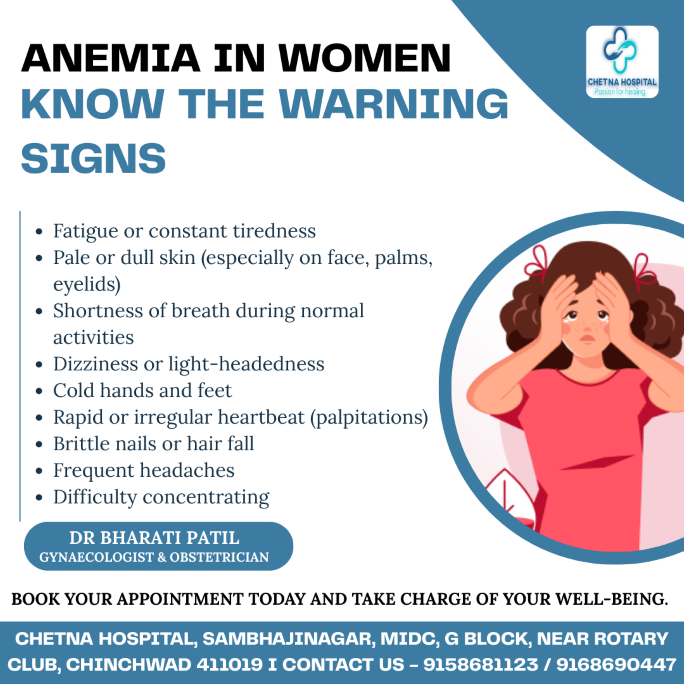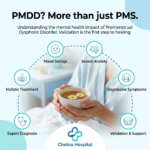Anemia is one of the most common yet often overlooked health conditions affecting women across all age groups. From adolescent girls to pregnant mothers and postmenopausal women, anemia can silently impact daily life, energy levels, productivity, and long-term health.
In this blog, we’ll explore what anemia is, why it’s more common in women, symptoms to watch out for, diagnosis, and treatment options.
🩺 What Is Anemia?
Anemia is a condition in which your body doesn’t have enough healthy red blood cells (RBCs) to carry adequate oxygen to tissues and organs. It leads to fatigue, weakness, and a variety of health issues, depending on its severity.
There are several types of anemia, but Iron Deficiency Anemia is the most common in women.
👩⚕️ Why Are Women More at Risk?
Women are more prone to anemia due to several biological and lifestyle factors:
1. Menstruation:
Heavy or prolonged periods can cause significant blood loss, leading to lower iron levels.
2. Pregnancy:
During pregnancy, a woman’s blood volume increases, and more iron is needed for the growing baby and placenta. Without supplementation, this can lead to iron deficiency.
3. Poor Diet:
Many women consume diets low in iron-rich foods, especially vegetarians or those on restrictive diets.
4. Postpartum Blood Loss:
Significant blood loss during childbirth can further contribute to anemia if not managed promptly.
❗ Common Symptoms of Anemia in Women
Anemia often develops gradually, and its symptoms are easy to dismiss as stress, overwork, or poor sleep. However, recognizing them early can help in timely intervention.
🔹 Key Symptoms Include:
- Fatigue or tiredness
- Pale or dull skin
- Shortness of breath
- Dizziness or light-headedness
- Cold hands and feet
- Rapid heartbeat or palpitations
- Hair loss or brittle nails
- Headaches
- Difficulty concentrating
- Chest pain (in severe cases)
If you experience several of these symptoms, it’s advisable to consult your doctor for a blood test.
🧪 Diagnosis: How Is Anemia Detected?
Your doctor may recommend the following tests:
1. Complete Blood Count (CBC):
This basic blood test checks your hemoglobin level, red blood cell count, and other indicators.
2. Serum Ferritin and Iron Levels:
To confirm iron deficiency and determine how much iron is stored in the body.
3. Peripheral Blood Smear:
To examine the shape and size of blood cells under a microscope.
4. Vitamin B12 and Folate Tests:
To rule out other types of anemia caused by deficiencies.
If you’re pregnant, your gynecologist will routinely check for anemia during your prenatal visits.
🍎 Causes of Anemia in Women
There are several causes of anemia, and addressing the root cause is key to effective treatment:
1. Iron Deficiency Anemia:
Caused by blood loss, poor diet, or malabsorption of iron.
2. Vitamin Deficiency Anemia:
Due to low intake or poor absorption of Vitamin B12 or folic acid.
3. Anemia of Chronic Disease:
Can be linked with long-term infections, autoimmune conditions, or kidney disease.
4. Postpartum Anemia:
Blood loss during childbirth or due to inadequate iron supplementation during pregnancy.
5. Inherited Anemias (Less Common):
Like thalassemia or sickle cell anemia – more common in certain regions or communities.
🥦 Dietary Recommendations to Prevent Anemia
Proper nutrition is a powerful tool in preventing and managing anemia. Include:
✅ Iron-Rich Foods:
- Spinach, kale, methi
- Dates, raisins, and jaggery
- Red meat, liver
- Beans, lentils, soybeans
- Fortified cereals
✅ Vitamin C Sources (Enhance iron absorption):
- Oranges, lemons, guava
- Tomatoes
- Bell peppers
✅ Folic Acid & B12 Sources:
- Green leafy vegetables
- Eggs, dairy products
- Whole grains
- Fish, chicken
Avoid drinking tea or coffee immediately after meals, as it can inhibit iron absorption.
💊 Treatment Options
1. Iron Supplements:
Most common treatment. Available as tablets, capsules, or syrup. Always take as prescribed.
2. Intravenous (IV) Iron:
Recommended for women with very low iron levels, absorption issues, or during pregnancy.
3. Vitamin B12 or Folic Acid Supplements:
Given in tablet or injection form if needed.
4. Treating the Underlying Cause:
If anemia is due to heavy periods, uterine fibroids, ulcers, or chronic disease – these conditions must be addressed.
5. Blood Transfusion:
Only in severe cases with dangerously low hemoglobin levels.
For Consultation Contact us on 9168690447 / 9158681123
Website –
Address – Chetna Hospital, Sambhajinagar, MIDC, G Block, Near Rotary Club, Chinchwad 411019
.
.
.
#hospital#pune#pcmc#chinchwad#health#healthcare#gynaecologist#femalegynaecologist#gynaecologistappointment#gynac#gynaecologistdoctor#gynaecologisthospital#goodgynaecologist#gynaecologistspecialist.













